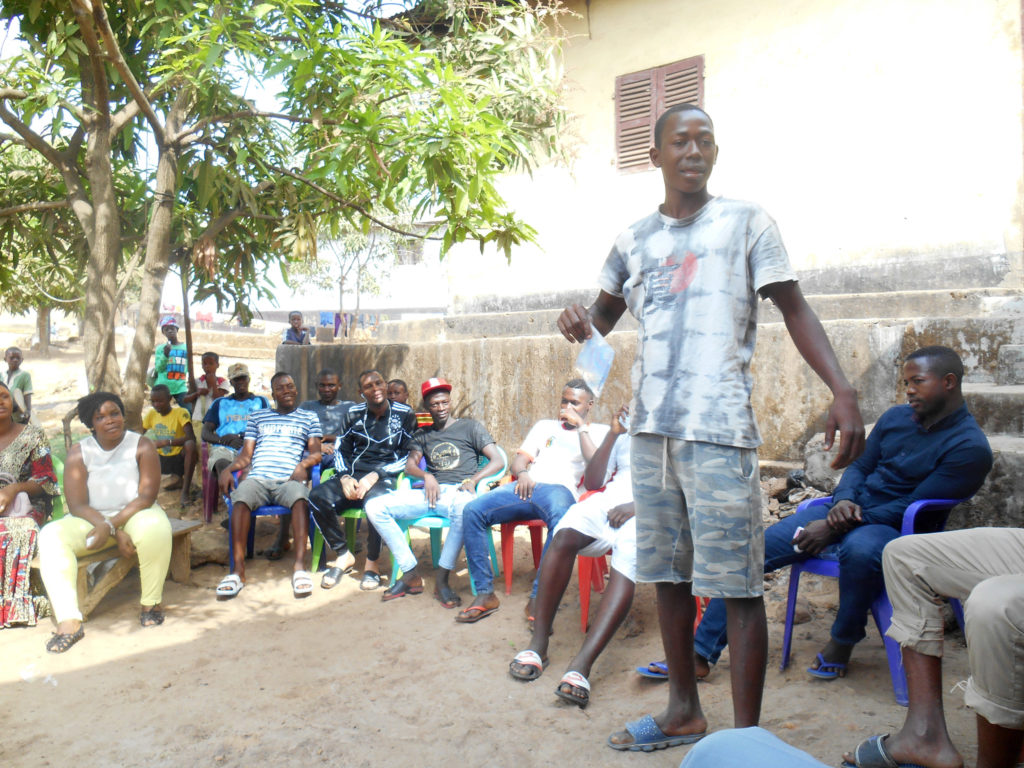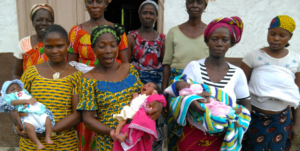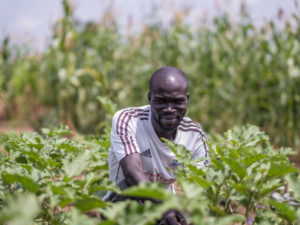Capacity Building & Research
ICMC strengthened the ability of civil society organizations to promote better mobility and advocate for safer migration policies in their region. Research of modern-day migration trends laid the foundation for empowering, dignified and person-centered responses in the future.

January
NGO representatives, migrant returnees, high-ranking police officers and academics drafted an advocacy roadmap to address gaps in national labor migration frameworks at a MADE West Africa seminar in Dakar, Senegal.

February
Migrant returnees and representatives of NGOs, trade unions, and governments outlined steps to stem illegal recruitment and assist returnees and trafficking survivors at a MADE West Africa seminar in Conakry, Guinea.

May
MADE West Africa co-organized a Forum on channeling diaspora resources into local enterprise development in Ghana. The event brought together diaspora investors, business representatives and policy makers.

May
A West African regional seminar for young people co-organized by the Future of Work project recommended collaborative capacity building, youth decision makers and awareness raising to respond to youth unemployment.

May
ICMC moderated a session on redesigning future work in light of ecological and societal realities at an international symposium in Paris within the Labour After Laudato Sí project.

June

October
ICMC contributions at a Future of Work seminar at the Jesuit university in Puebla, Mexico, emphasized the importance of transitioning from an economic society to a social economy.

Dispelling Migration Myths in West Africa
Mohammed, a Guinean in his late twenties, estimates he walked his way through more than 20 pairs of shoes during his 18-month Moroccan migration odyssey, an experience which he calls “hell.”
Back at home, he is telling his story to other young Guineans, who, like he was, may be tempted to emigrate by the perspective of a better life elsewhere. How did he replace 20-some pairs of shoes, one of the young people wants to know? Mohammed smiles: “I stole them in the mosques.” His response provokes laughter in the group but the rest of his story brings home to those listening the harsh, dangerous realities of irregular migration.
A lack of future prospects combined with myths that paint an unrealistic picture of life abroad are a powerful migration lure for Guinean youth. The Association for Economic and Social Development (ADES), a MADE West Africa partner, works to prevent irregular migration by letting young people who have tried it share their experiences with those who may be considering it.
Fostering Civil Society Engagement
ICMC Europe continued its coordination of MADE (Migration and Development) West Africa in the program’s third year of implementation, promoting the positive impact of migration and mobility on development in the region.
Over the past year the program served further to build capacity, strengthen networks, facilitate development and promote civil society in Burkina Faso, Ghana, Guinea, Senegal, Sierra Leone and Togo. Ongoing foci were the implementation of the Economic Community of West African States (ECOWAS) Free Movement Protocol, protection of migrant workers and enhancement of diaspora contributions.
During 2019, ICMC Europe and program partners held a series of multi-stakeholder training sessions and in-country workshops in Guinea and Senegal. The ten meetings provided space for actors from different sectors and contexts to exchange experiences, build trust and develop a common vision and approach.
During the seminars, participants worked together to identify new ways to improve the effectiveness of their activities and steps forward. The recommendations will be incorporated into roadmaps for more robust protective migration frameworks and civil society involvement in migration governance.
Together with its partners, ICMC Europe gave seed funding and practical support to five grassroots organizations in five of the project’s target countries which are engaged in work related to the three MADE West Africa focal points. In doing so, ICMC Europe enabled these NGOs to expand educational activities on the ECOWAS Free Movement Protocol and raise awareness about mobility and safe migration, as well as increase support for diaspora investment and entrepreneurship.
ICMC Europe partnered with ADES, an economic and social development NGO in Guinea, to combat illegitimate recruitment of youth and prevent deaths at sea. The program held awareness raising activities in Kindia in the western part of the country, reaching over 3,800 people – nearly 40 percent women – in a ten-month period.
“This was the first time that I see these unbearable images and hear such heartbreaking true stories. … What I have just experienced is a far cry from what we are told. Thank you for revealing the reality of these illegal recruiters who hide the truth from us.” — A participant after viewing an ADES photography exhibit on irregular migration
Shaping the Future of Work
In 2019 ICMC assured overall coordination of the project The Future of Work, Labour After Laudato Sì. The project aims to promote and expand the responses of Catholic-inspired and other faith-based organizations to the evolving labor market in the spirit of Pope Francis’ second encyclical. A collaboration with the International Labour Organisation and the Vatican’s Dicastery for Promoting Integral Human Development, The Future of Work encourages better global governance and wider sharing of good NGO practices.
ICMC spearheaded study of the interface between jobs, demography and migration, one of the project’s six areas of research on labor. ICMC commissioned three think-tanks, related to the Scalabrini Missionaries of St. Charles Borromeo, to document migrant and refugee realities in the world of work. The research sought to pinpoint drivers of labor migration and challenges migrant workers are facing in order to develop person-centered responses that align with Catholic social teaching.
The New York-based Center for Migration Studies explored ethical foundations for the future in light of migration and work developments such as increasing long-term, forcible displacement and workplace automation.
Research by the Scalabrini Migration Center in the Philippines focused on efforts to position agriculture as an innovative, durable livelihood for Filipino young people, thus offering an alternative to migration. A second study surveyed migrant fisherman in Taiwan who are exposed to a number of protection issues.
The Scalabrini Institute for Human Mobility in Africa interviewed migrants, including refugees and asylum seekers, in Cape Town, reviewing the effect of government policy on their work environment. Many of these migrants work in unregulated trades, which exposes them to greater risk of exploitation, violence and xenophobia.
The research organizations presented their findings at a high-level regional conference co-organized by ICMC in December in Bangkok. The reports underlined the need to implement cooperative solutions between States that prioritize protection, promotion and integration. For the Church, respect for the humanity, dignity and potential of each person forms the starting point.
In January ICMC co-organized an international Future of Work research seminar examining a number of complex, contemporary labor-related issues. Output from seminar discussions formed the basis for a set of proposals intended to enhance the ILO’s Decent Work Agenda, informed by a Laudato Sì lens.
In a statement to the 108th Session of the International Labor Conference in Geneva in June, ICMC put forth four of these recommendations to steer positive development of labor in the future. In doing so, ICMC emphasized the centrality of integral human development, environmental considerations, collaboration with civil society and attention to migrants and refugees.
The Laudato Sí project group also contributed to the April publication by the Caritas in Veritate Foundation of Rethinking Labour: Ethical Reflections on the Future of Work. Released to commemorate the ILO’s centenary, the publication looks at current labor issues, bringing in a faith-based perspective on the future of work. It highlights ICMC vocational training activities with refugees in Jordan and Pakistan.
Integrating Trafficking Survivors

Diaspora Migrants as Agents of Development
Migrants in diaspora communities make prime development actors – bringing personal experience, skills, ties to government and civil society to drive lasting change in their countries of origin. In Abidjan, Ivory Coast, a first-ever diaspora-led event on diaspora co-development explored how migrants abroad are caring for their original home communities. ICMC Europe partner FORIM organized the meeting within the MADE West Africa program, which focuses on maximizing such diaspora contributions. “When members of the diaspora are seen as agents of development in their countries of origin, this positive view gives them a sense of empowerment and helps challenge other negative views of migration,” says FORIM Secretary General Patrick Rakotomalala.
Much is being done to combat international human trafficking. Less is known about exploitation-free integration of survivors into their new host communities. ICMC Europe partnered with seven faith-based actors to launch the Right Way project in early 2019 to address this gap. The project is exploring ways to build holistic, long-term integration pathways with third country nationals who have experienced trafficking.
Funded by the European Commission and led by Associazione Comunita Papa Giovanni XXIII, Right Way looks at people-centered, gender-specific approaches taken to integrate Nigerian women who have experienced trafficking for sexual exploitation within the EU.
Last year ICMC Europe took part in the early stages of the project, gathering data to inform the development of pilot integration pathways in Italy. The research drew on academic literature, interviews with survivors and other stakeholders and analysis of promising work in Belgium, France, Italy, the Netherlands, Spain and Sweden.
ICMC Europe and the other Right Way partners drafted a foundational integration model based on these research findings. Using building blocks for phases from detection to autonomy, the model proposes practical actions that benefit both survivors and communities. ICMC Europe emphasized the importance of tailoring the integration pathway by incorporating key considerations such as culture into all related actions.
“People-centered work is the Catholic approach. People are your starting point, not your ending point. … We’re not sure what the future will look like, but what we are sure of, from a Catholic perspective, is that that process ought to serve human beings, not subjugate them or replace them. It should promote human dignity.” – Donald Kerwin, Director of the Center for Migration Studies.
Member's story
Investing in the Future in Uganda
Uganda is host to over 1.42 million refugees, of whom over 200,000 entered the country in 2019. More than six out of ten have fled war in South Sudan. Bidi Bidi refugee settlement opened in September 2016 in northwestern Uganda to offer protection to South Sudanese forcibly displaced as the conflict spread to the country’s Equatorial region. The refugee settlement, which quickly grew to one of the world’s largest, is now home to nearly 233,000 people.

ICMC national member organization Caritas Uganda is supporting refugees in Bidi Bidi and the local community to ensure food security and build a sustainable future. Mere weeks after the first refugees arrived on Bidi Bidi’s dusty, rocky plain, Caritas began distributing seeds and tools so that the new arrivals could grow crops like okra, cabbage and groundnuts to supplement their diets and sell at local markets to earn cash. In 2019 the focus shifted from emergency support to longer-term food security efforts.
Caritas Uganda launched programs aimed at increasing the capacity of refugees and members of host communities to earn a regular income while stabilizing the local economy. Farmers could learn about irrigation, land use and raising livestock through a Farmer’s Field School offering agricultural training.
Further occupational training tackles the challenge of unemployment among young people. Caritas offers young men and women, from both the refugee and local communities, the chance to learn a trade such as carpentry, hair dressing, tailoring or mechanics through a six-month scheme at a local, Catholic or government-run training institution.
With mentoring at local institutions and businesses, the option of an additional one-month apprenticeship better positions the young people for the job market. Assistance in finding a job or establishing a business is available for those who have completed both vocational training and apprenticeship. A community-based, non-certificate-level skills training program complements the vocational training, allowing women, girls and others without the education required for entrance into the training institutions to learn skills such as sewing and soapmaking. They also receive start-up kits to launch a home business and earn supplementary income.
Some 400 young people have completed the training programs since they were launched in 2016. One in four are running a profitable business, while nearly a third help their families to afford adequate nourishment. As well as providing an income for them in Bidi Bidi, the refugees know they now have employable skills for when they can return to South Sudan.
In 2018-2019 Caritas expanded its training programs in Bidi Bidi and to the neighboring Palorinya refugee settlement. Nearly 200 more young people have gained livelihood skills, bringing hope of a better future.

